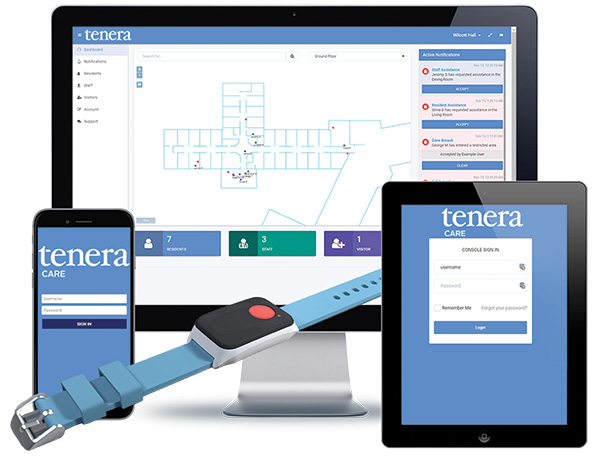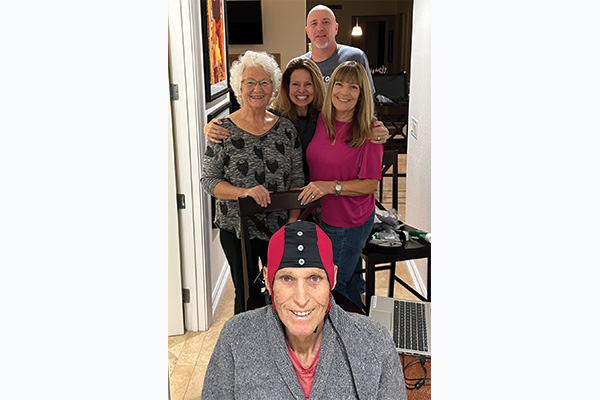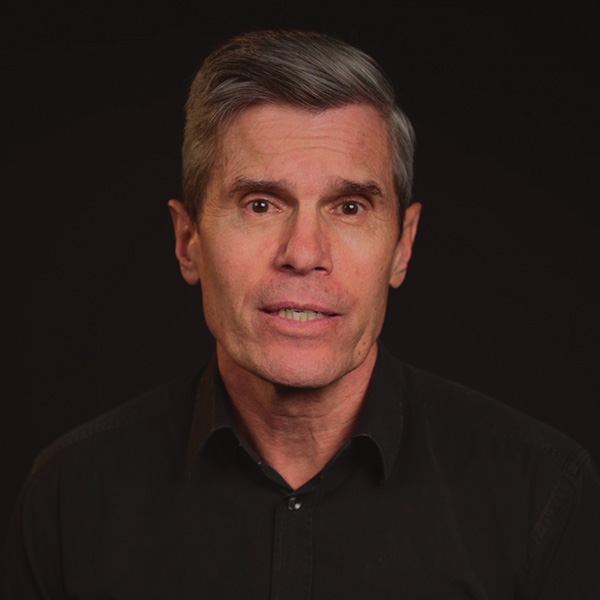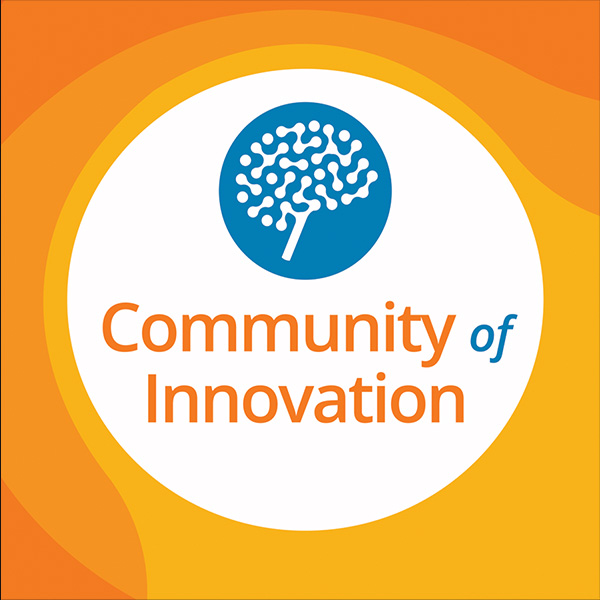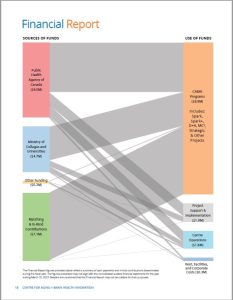
Daring to Disrupt:
Reimagining the
Aging Experience
2022–23 Impact Report
DIGITAL VERSION


Reimagining the Aging Experience
Last year at CABHI we continued our strong track record, further expanding our leadership position as the preeminent and most active global innovation accelerator in the aging and brain health sector.
Read a message from our President and Chief Scientist, Dr. Allison Sekuler, and The Chair of our Board of Directors, Jeff Blidner.$160M
funding directed toward advancing healthcare innovations
3,820+
Highly Qualified Personnel (HQP) working on CABHI projects
87,000+
older adults and caregivers engaged with CABHI projects
$561M+
secured investments by CABHI innovators and companies
$64M
in jobs created and sustained
141
solutions introduced into real-world clinical and commercial settings
451
projects launched
347
unique solutions funded by CABHI
305,000+
People reached through CABHI-supported educational events, information sharing activities, and communications
1,650
partnerships and collaborations across CABHI’s global network
*Figures as of March 31, 2023.
-
April 2022
April 2022
CABHI and the Trade Council of Denmark sign a Memorandum of Understanding confirming their plans to work together in support of innovation focused on aging and brain health, with a particular focus on healthy aging and cognitive health.
CABHI staff address the AgeTech Review, a virtual summit featuring talks by industry leaders and rehabilitation professionals in the health tech, innovation, and aging space.
-
May 2022
May 2022
After a soft launch last year, the Leap program expanded and now includes members from across Canada, and internationally. Leap bridges the gap between its members – older adults and caregivers – and the innovators developing solutions meant
for them. -
June 2022
June 2022
The Discover and Adopt (D+A) program officially launches, offering up to $150,000 to support care delivery organizations to introduce, implement, and sustain innovations
that address their pain points. -
July 2022
July 2022
CABHI announces the Learning Inter-Professionally Healthcare Accelerator (LIPHA), a free training tool for staff in long term care homes
in Ontario. -
September 2022
September 2022
The global Longitude Prize on Dementia, awarded to creators of a technology that learns from a person living with dementia and enables them to continue living independently, included members of CABHI’s Seniors Advisory Panel as judges.
Leap hosted a week-long virtual open house. Popular attractions included a Digital Literacy Club meet-up and a session about How to be an Innovation Collaborator.
CABHI participated in an Industry Spotlight at Dalhousie University, which focused on aging and brain health challenges and opportunities.
-
October 2022
October 2022
The Mentorship, Capital, Continuation (MC²) program launched its Fall 2022 call for applications offering up to $400,000 for early-stage companies looking for growth capital and acceleration services.
CABHI’s Spark program returned, offering up to $50,000 in grant money and acceleration services over 12 months to develop, refine, and implement innovative solutions to challenges identified by point-of-care staff.
-
November 2022
November 2022
CABHI participated in the Let’s Talk Science event on Parliament Hill in Ottawa.
Several CABHI-funded companies were showcased at HLTH 2022. Considered one of healthcare’s premier innovation events, HLTH attracts leaders to solve healthcare’s most pressing problems.
-
December 2022
December 2022
CABHI participated in the Canadian Women-only Business Mission to Japan highlighting healthcare and clean tech innovations that Canadian women entrepreneurs bring to these sectors.
Mary Furlong & Associate’s Longevity Venture Summit in Washington D.C. featured speakers from CABHI at the event’s in-person and online sessions.
-
January 2023
January 2023
Announcement of the UK-Canada AgeTech Innovation Exchange, of which CABHI is a partner.
CABHI honoured Alzheimer’s Awareness Month with a series of blogs, podcasts, and promoted a new tool developed in partnership
with Baycrest that helps older adults living with dementia make informed decisions about when to stop driving. -
February 2023
February 2023
CABHI’s 2nd Innovation Showcase event, held at JLabs in Toronto, spotlighting Mentorship, Capital, and Continuation (MC²) program’s portfolio companies.
MC² program announced its Winter 2023 call for applications from early-stage companies looking for growth capital and acceleration services.
CABHI participated in a federal trade mission to Israel organized by Canada’s Trade Commissioner for Canadian Medical Devices, Digital Health, and Brain Health/Aging R&D. CABHI was also invited to speak at the LongeviTech TLV conference in Tel Aviv.
-
March 2023
March 2023
CABHI Summit was CABHI’s largest summit to date, with over 1350 registrants from 32 countries. Theme: Daring to Disrupt: Reimagining the Aging Experience.
Government of Canada announces re-funding of $30 million to CABHI to continue to help accelerate innovation in aging and brain health.
CABHI has made significant advances in the fields of brain health innovation, improving the lives of people living with dementia and their caregivers.
These CABHI-supported products and programs save time, provide support, improve cognition, and could even save lives. Here are some recent examples.
CABHI is the preeminent and most active global innovation accelerator in the aging and brain health sector. All projects and programs we support align with our mission, vision and innovation themes.
Core Themes
Aging at Home. Enabling older adults including people living with dementia to live in the setting of their choice and remain active in their communities for as long as possible.
Caregiver Support. Supporting day-to-day caregiving responsibilities, providing education or training on caregiving topics, or helping caregivers maintain their own well-being while they care for older adults and people living with dementia.
Care Coordination and Navigation. Helping older adults and people living with dementia and their caregivers navigate the healthcare system to access timely and appropriate care, while also supporting healthcare providers to align their practice with long-term care standards.
Cognitive and Mental Health. Ensuring early detection of cognitive impairment or dementia in older adults; implementing preventative care approaches to maintain or enhance older adults’ brain health, including both cognitive and mental health supports; protecting the cognitive and mental health of seniors care and/or dementia healthcare providers and caregivers.
Financial Health and Wellness. Helping older adults remain financially independent, stay safe in the workforce longer, seek later-life employment, prepare for retirement, plan for financing care, or prevent financial exploitation.


Core Themes
Aging at Home. Enabling older adults including people living with dementia to live in the setting of their choice and remain active in their communities for as long as possible.
Caregiver Support. Supporting day-to-day caregiving responsibilities, providing education or training on caregiving topics, or helping caregivers maintain their own well-being while they care for older adults and people living with dementia.
Care Coordination and Navigation. Helping older adults and people living with dementia and their caregivers navigate the healthcare system to access timely and appropriate care, while also supporting healthcare providers to align their practice with long-term care standards.
Cognitive and Mental Health. Ensuring early detection of cognitive impairment or dementia in older adults; implementing preventative care approaches to maintain or enhance older adults’ brain health, including both cognitive and mental health supports; protecting the cognitive and mental health of seniors care and/or dementia healthcare providers and caregivers.
Financial Health and Wellness. Helping older adults remain financially independent, stay safe in the workforce longer, seek later-life employment, prepare for retirement, plan for financing care, or prevent financial exploitation.

Cross-Cutting Themes
Diversity, Accessibility, and Health Equity. Ensuring aging and brain health needs are addressed, and solutions are accessible, for Indigenous, Black, or racially and culturally diverse communities; women; people living with disabilities; members of the 2SLGBTQI+ community; rural or Northern communities; or other vulnerable populations; and including issues of intersectionality.
Promoting Social Inclusion and Preventing Stigma and Elder Abuse. Creating opportunities and programs for enhanced engagement and social connection for older adults, including intergenerational programs, to combat ageism and stigma and support strong cognitive and mental health in older adults. Protecting older adults, particularly those living with cognitive decline and dementia, against elder abuse and other unsafe relationships.

Cross-Cutting Themes
Diversity, Accessibility, and Health Equity. Ensuring aging and brain health needs are addressed, and solutions are accessible, for Indigenous, Black, or racially and culturally diverse communities; women; people living with disabilities; members of the 2SLGBTQI+ community; rural or Northern communities; or other vulnerable populations; and including issues of intersectionality.
Promoting Social Inclusion and Preventing Stigma and Elder Abuse. Creating opportunities and programs for enhanced engagement and social connection for older adults, including intergenerational programs, to combat ageism and stigma and support strong cognitive and mental health in older adults. Protecting older adults, particularly those living with cognitive decline and dementia, against elder abuse and other unsafe relationships.
CABHI was founded with the principles of accessibility and inclusion at its core. These principles underlie its overarching goal of empowering older adults to age in settings that support their diverse needs and offers autonomy and agency with improved brain health and quality of life.
CABHI’s Ongoing Commitment to
Equity, Diversity, and Inclusion
CABHI goes well beyond tracking equity, diversity, and inclusion (EDI) key performance indicators and using them to inform positive changes in every funded project; it embeds EDI principles into the very fabric of its programs, services, and internal operations, as well as interactions with diverse end users and innovation communities.
For example, CABHI continues to look for innovation themes that address health issues faced by underrepresented and historically marginalized communities. Recently, CABHI integrated the Indigenous, Diverse, and Rural Populations Innovation Theme into the cross-cutting Diversity, Accessibility, and Health Equity Theme to ensure the aging and brain health needs of individuals from these underrepresented communities are met with accessible solutions.
Reflecting its commitment to continuous improvement, CABHI is developing an EDI Roadmap in consultation with internal and external stakeholders. The EDI Roadmap will include specific, measurable, attainable, realistic, and timely (SMART) objectives, outreach initiatives to underrepresented groups, and needs-based outcomes. The inaugural plan will extend to 2025, and CABHI’s EDI Task Force will revisit it frequently.
The EDI Roadmap will lay a path forward for advancing short-term and longer-term EDI initiatives, applying EDI principles to the following key areas:

CABHI is considering how it offers ongoing educational programming, such as lunch and learns and case studies, to encourage ongoing learning, listening, and difficult conversations on social issues relevant to the work and collaborative culture on topics of Indigenization and Indigenous inclusion, racial equity, disability and accessibility, 2SLGBTQI+ inclusion, gender equity, experiences of rural and Northern communities; and other vulnerable and marginalized groups. Additionally, CABHI will continue efforts into staff training in sex and gender-based analysis, unconscious bias, research methodology, and legislation ensuring accessibility by people with disabilities to mitigate biases toward individuals from marginalized communities.
CABHI is evaluating its programs and services to ensure EDI metrics, including sex and gender-based analysis considerations, are integrated into calls for innovation, selection processes for award recipients, funded projects, support services, and the language used in marketing communications. At the same time, CABHI is considering how innovative programs and products address challenges affecting seniors from underrepresented and diverse populations.
CABHI is regularly reviewing its hiring and governance practices to improve and promote diverse representation among employees, leadership, and board members.
CABHI is working toward embedding EDI principles within practices and processes that can help close the gap between innovators and end-user groups, including older adults, caregivers, healthcare professionals, and healthcare provider organizations. The Leap platform provides a unique opportunity for innovators to engage meaningfully with different communities of diverse end users to understand their pain points and what it takes to achieve innovation adoption.
CABHI’s programs and projects are created in alignment with our mission, vision, and innovation themes to improve quality of life in the aging and brain health sector.
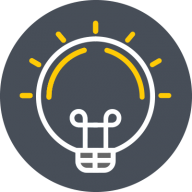
Frontline Fixers:
CABHI’s Spark Program
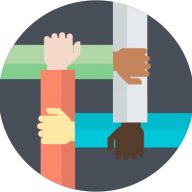
Bridging the Gap:
Mentorship, Capital
and Continuation Program

Matchmaking for Innovation:
Discover and Adopt Program
Point-of-care healthcare workers have unique insights into their workplaces, their systems, and the people for whom they care. They also know what needs to be improved upon. Spark offers funding for them to do just that – to take their innovative ideas from concept to testing to implementation to improve the lives of older adults, and healthcare delivery in general.
For many older adults, vision loss negatively affects their quality of life. Maintaining good vision in older adults will in turn lead to prolonged independence and possibly reduce the risk of age-related cognitive declines such as dementia. Re:Garde is the first low-cost, personalized, remotely managed program that can improve visual perception. This virtual reality intervention has been previously validated in clinical trials at Toronto Western Hospital.
Often, early-stage fintech and healthtech innovations encounter funding gaps. The Mentorship, Capital and Continuation program, or MC² in partnership with National Bank, provides funding and acceleration services to advance the scale and growth of their companies.
Alzheimer’s disease and related dementias are a major cause of disability for older adults. Optina’s approach to age-related memory loss combines imagery and artificial intelligence to produce ocular imaging systems and diagnostic tools designed to help detect early biomarkers of dementia. With CABHI’s support, Optina looks to conduct further clinical trials as it expands to additional clinical areas: brain health, eye health, and vascular health.
CABHI’s newest program, Discover and Adopt (D+A) matches healthcare delivery organizations with identified pain points to vendors that can resolve them. With CABHI’s support, organizations then implement and test the innovation in their own settings, and upon successful improvement in health outcomes and other metrics, the innovative solutions are positioned for continued procurement. In its first year, D+A funded six organizations in Ontario looking to build capacity and improve the care of older adults. Intent is to now scale this program nationally.
Schlegel Villages was seeking a solution to reduce workload related to meal service in their dining rooms. Pudu Robotics was the answer. Their BellaBot robot’s bionic design facilitates a seamless and safe food delivery to residents.

Frontline Fixers:
CABHI’s Spark Program
Point-of-care healthcare workers have unique insights into their workplaces, their systems, and the people for whom they care. They also know what needs to be improved upon. Spark offers funding for them to do just that – to take their innovative ideas from concept to testing to implementation to improve the lives of older adults, and healthcare delivery in general.
For many older adults, vision loss negatively affects their quality of life. Maintaining good vision in older adults will in turn lead to prolonged independence and possibly reduce the risk of age-related cognitive declines such as dementia. Re:Garde is the first low-cost, personalized, remotely managed program that can improve visual perception. This virtual reality intervention has been previously validated in clinical trials at Toronto Western Hospital.

Bridging the Gap:
Mentorship, Capital
and Continuation Program
Often, early-stage fintech and healthtech innovations encounter funding gaps. The Mentorship, Capital and Continuation program, or MC² in partnership with National Bank, provides funding and acceleration services to advance the scale and growth of their companies.
Alzheimer’s disease and related dementias are a major cause of disability for older adults. Optina’s approach to age-related memory loss combines imagery and artificial intelligence to produce ocular imaging systems and diagnostic tools designed to help detect early biomarkers of dementia. With CABHI’s support, Optina looks to conduct further clinical trials as it expands to additional clinical areas: brain health, eye health, and vascular health.

Matchmaking for Innovation:
Discover and Adopt Program
CABHI’s newest program, Discover and Adopt (D+A) matches healthcare delivery organizations with identified pain points to vendors that can resolve them. With CABHI’s support, organizations then implement and test the innovation in their own settings, and upon successful improvement in health outcomes and other metrics, the innovative solutions are positioned for continued procurement. In its first year, D+A funded six organizations in Ontario looking to build capacity and improve the care of older adults. Intent is to now scale this program nationally.
Schlegel Villages was seeking a solution to reduce workload related to meal service in their dining rooms. Pudu Robotics was the answer. Their BellaBot robot’s bionic design facilitates a seamless and safe food delivery to residents.
CABHI offers its innovators a suite of acceleration services. Our goal is to provide end-to-end support guiding innovation at different stages of development through the innovation pipeline to develop, test, validate, implement and scale their product or service.
Coaches Community
Volunteer business coaches play a crucial role in supporting individuals, startups, and small businesses by offering their expertise, guidance, and mentorship based on their knowledge and experience. They may provide training in areas like leadership, health systems, regulatory strategy, intellectual property, negotiation, marketing, and growth strategies.
Leap
Leap is an online community of older adults with lived experience who collaborate with innovators
to share their insights. Members are empowered to tell their stories, learn from each other, while providing critical input to innovators on refining their solutions to ensure they are accessible, affordable, and meet real needs. Leap members are demonstrating and advocating for an intergenerational, age-friendly world where older adults are valued as contributing members. Leap is growing; membership has increased two-fold.
Innovation Network
The companies supported by CABHI’s funding programs benefit from access to a range of organizations that help transition ideas into products and services which improve the lives of older adults and their caregivers.
Our members:
- gain early access to promising CABHI-vetted innovations that address strategic priorities and improve client care, safety, and quality of life;
- build organizational capacity to test, validate, and adopt novel solutions; and
- join a broader innovation ecosystem to exchange learnings and opportunities.
You must put it in the hands of the people you created it for.
– Dr. Morgan Barense
The Impact of End User Testing
In the summer of 2022, Leap members helped Rotman Research Institute’s senior scientist Dr. Morgan Barense test a memory augmentation technology called the HippoCamera app. “In some cases, what we thought were pain points didn’t pose any obstacles to the Leap member participants,” Dr. Barense told us. “Other times, they brought forward issues we hadn’t even considered.”
End user testing is critical to research and product development. “You must put it in the hands of the people you created it for,” Dr. Barense said. The experience working with Leap was very productive, and even fun for all. She noted that participants were motivated not just to test HippoCamera; rather they felt they were contributing to improving brain health more generally. Thank you Leap community!
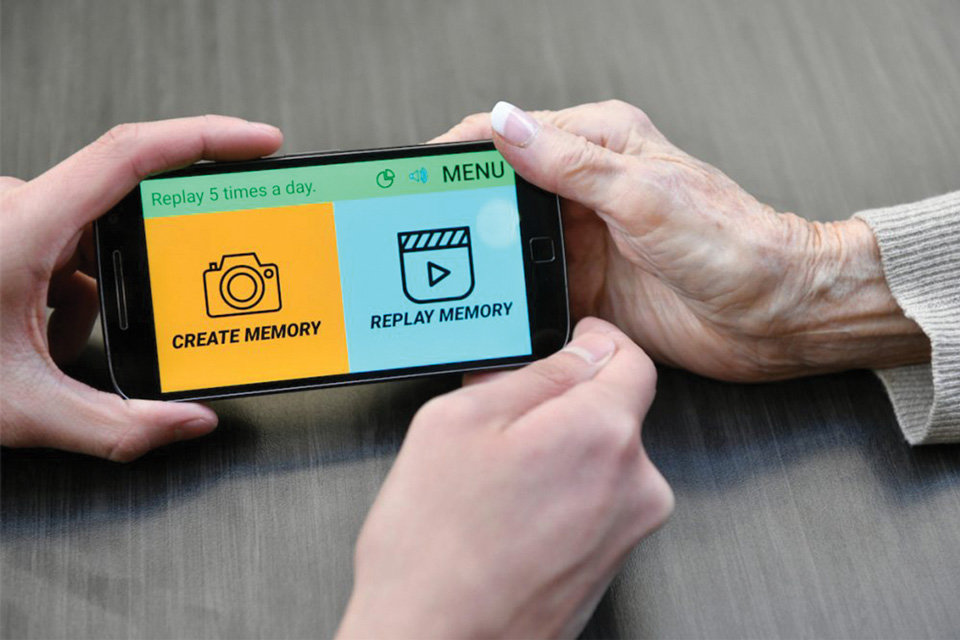
CABHI is much more than an innovation accelerator: it is the preeminent thought leader in the agetech sector, dedicated to building a strong culture of innovation that connects local, national, and international innovators with end users. CABHI continues to grow its influence in Canada and globally, recognizing that strong networks, knowledge mobilization, and advancing the aging and brain health ecosystem are fundamental to accelerating promising agetech innovations from design to development to adoption and to making meaningful impact.
CABHI is prepared to focus our efforts and leverage the opportunities in the national and global ecosystem with a strategic plan CABHI 2025: Accelerate Innovation + Apply Impact.
In the coming year, we will enhance our focus on the following initiatives under each strategic objective as follows:

Advance the health and well-being of Canadians at home, in the community, and in care settings.
Learn more
Build a skilled workforce and system-level capacity that mobilizes innovation, from idea to uptake to impact.
Learn more
Realize the full potential of Canadian innovation to build a more resilient, sustainable, and competitive economy.
Learn morePlease click on the Financial Report to view.
If you have any questions or would like more information about CABHI or our annual report, please contact info@cabhi.com.

Lora Bruyn Martin, MASc
Innovation Specialist at Schlegel Villages
I think that the D+A program is a fantastically unique program. Not only does it provide funding which means we can have dedicated resources allocated to the innovation project, but also provides education and coaching on adopting innovation. That includes everything from how you engage stakeholders at the beginning of the process, how to dig deep and understand what the problem is to, at the very end, how to assess the impact of the innovation that you’ve adopted.

Vineet Johnson
Founder & CEO, IRegained Inc.
IRegained Inc. benefited enormously from the MC2 Capital program offered by CABHI. In addition to funding, access to CABHI’s network of mentors and advisors continues to play a significant role in our business development and go-to-market strategies. CABHI’s staff are always accessible and have supported us throughout this journey. I would strongly recommend CABHI to all start-ups operating in this space.

Jackie Song, RD, MSc
Interim Manager of Practice Innovation
and Change at Unity Health Toronto
The Discover and Adopt program allowed for connections to groups that we normally would not otherwise have interacted with. We really appreciated those aspects of the program and are very excited to be a part of it.




